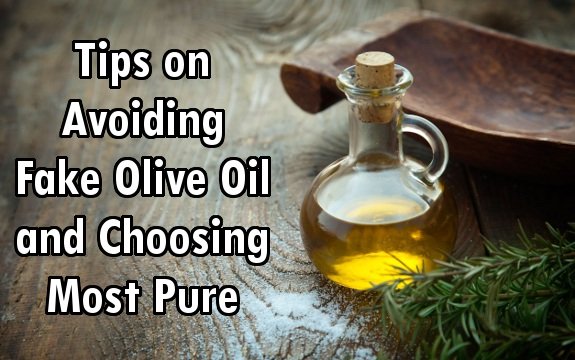Tips on Avoiding Fake Olive Oil and Choosing the Most Pure

 Pure virgin olive oil is a very beneficial oil for cooking with moderate heat and using on raw foods and salads, but there have been several cases of fraud discovered in the olive oil industry over the last two decades. Hardly anyone gets prosecuted, although a lot of doctored oil does get destroyed.
Pure virgin olive oil is a very beneficial oil for cooking with moderate heat and using on raw foods and salads, but there have been several cases of fraud discovered in the olive oil industry over the last two decades. Hardly anyone gets prosecuted, although a lot of doctored oil does get destroyed.
The bottom line is that you need to be privy to the fake olive oil sold by many companies if you want to choose only the best.
Deceptive Labeling
There is no third party to determine whether the oil is pure virgin olive oil, whether it is mixed with partially hydrogenated oils, soy, hazelnut, or canola, or whether it is from other places outside Italy, the world’s largest source of olive oil. Companies have been caught red handed doing this with huge volumes of oil, but very little comes of it as the heads of big edible oil producers in Europe are often politically well connected.
The producers’ attitude is that if it smells good and tastes good, then it’s good oil. There is no mention of adulterating the health benefits of olive oil, and that’s what affects health conscious consumers. The hard fact is simply most what is labeled extra virgin olive oil from abroad simply isn’t, and moderately priced California olive oils are now better. So are the expensive ones.
Slipping You the Bad Stuff
Displaying “partially hydrogenated” on the labels of olive oils mixed with up to 20% of other hydrogenated oils is not required. Partially hydrogenating keeps liquid vegetable seed or nut oils processed with heat or chemicals from going rancid. It extends shelf life. But these partially hydrogenated oils create many of the health problems that plague us, including obesity, diabetes, cardiovascular diseases, and even cancer. The FDA has even recognized the danger of trans fats/hydrogenated oil, and should be imposing an official ban soon.
Consider how hazelnut, soy, canola, and other oils are transported by ship, then by rail to refineries who process them, then mixed with olive oil that’s been sitting in silos, and then bottled and shipped out to different countries to sit on shelves until purchased.
There has to be some processing and hydrogenating of those oils for it to last all that time. When these are mixed with olive oil, the health benefits of olive oil are nullified with the toxicity of processed, partially hydrogenated oils. You can’t trust those big plastic bottles in discount stores and supermarkets that are labeled extra virgin or virgin olive oil.
Be aware of fake, low quality olive oil.
Here’s the Good Stuff
The oil from 100% pure cold pressed olives does have a long enough shelf life without hydrogenation (two to three years) because of its innate unaltered antioxidant content. The health benefits of olive oil’s polyphenols, antioxidants, vitamins, and minerals remain intact for the consumer.
With pure premium olive oil, olives are picked by hand to keep the olives intact and to keep out the leaves and twigs. Then it has to be cold pressed within a short time to separate the oil without heat or chemicals. Centrifuges are often used, but purists use traditional stone pressing. Centrifuges require water that rinses many of the water soluble antioxidant polyphenols away. Stone cold pressing is better.
The oil should come in tinted glass bottles or stainless steel cans. Oil will leech chemicals from plastic, and sunlight may turn the oil rancid. Traditional small producers often provide unfiltered oil, which will show up as cloudy or with some sediment, and they use organic olives.
Moderately priced California oils that rate highest with Consumer Reports are Trader Joe’s California Estate and McEvoy Ranch. Others that are priced well but not compromised include Kirkland Signature Select Toscano (Costco) and Whole Foods’ 365 Everyday Value 100% Californian Unfiltered.
Additional Sources:

Get a look at the ingredients on the packet of “olive oil” from Subway. It’s an olive oil watered down with lesser oils.
Why has there never been an independent agency formed here in the USA, either by the OCA, or organizations, such as this one, to have reps to go to retail stores, and pull olive oil, or other things off the shelves, weekly.. that get tested to be what they are supposed to be, or not”
I know that i would pay monthly for a list of what to buy and what NOT to buy, if there were such a thing…
and it would serve to make things much more difficult for those that want to pull the wool over their customer’s eyes.